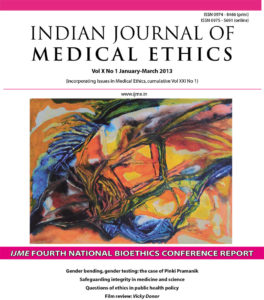
The IJME Fourth National Bioethics Conference recently concluded in Hyderabad. The meeting co-hosted by the University of Hyderabad, the Council for Social Development, Hyderabad, and the Forum for Medical Ethics Society, saw over 370 participants from all over the country and abroad, thoroughly absorbed by the three days of robust discussion on the many ethical and regulatory challenges facing health research. This was proof that the ethics movement is establishing itself in India.
However, a few hundred researchers and clinicians taking an interest in ethics is not enough. The increasingly commercialised healthcare system demands a larger response. Many, many more people need to be involved to be an effective force for change, and in different ways. IJME invites providers, researchers, academicians, teachers and students, from biomedical sciences, social sciences, humanities and law, to make their voices heard through its pages.
This issue carries the report of NBC 4 and two thought provoking plenary addresses delivered at the conference. An editorial outlines the dual responsibilities of health providers in cases of sexual assault. A writer from Brazil looks at the role played by “moral consensus” in changing the law on end-of-life care in that country. Two commentaries analyse the practice of “gender testing” and its implications for ethics and for society. A study documents the need to monitor the practices of “medical tourism facilitators” at the international level. A physician comments on the role played by medical professionals in inciting communal violence in Gujarat.
Cover credit: Original painting by kind courtesy of the artist, Dr Raman Kutty
